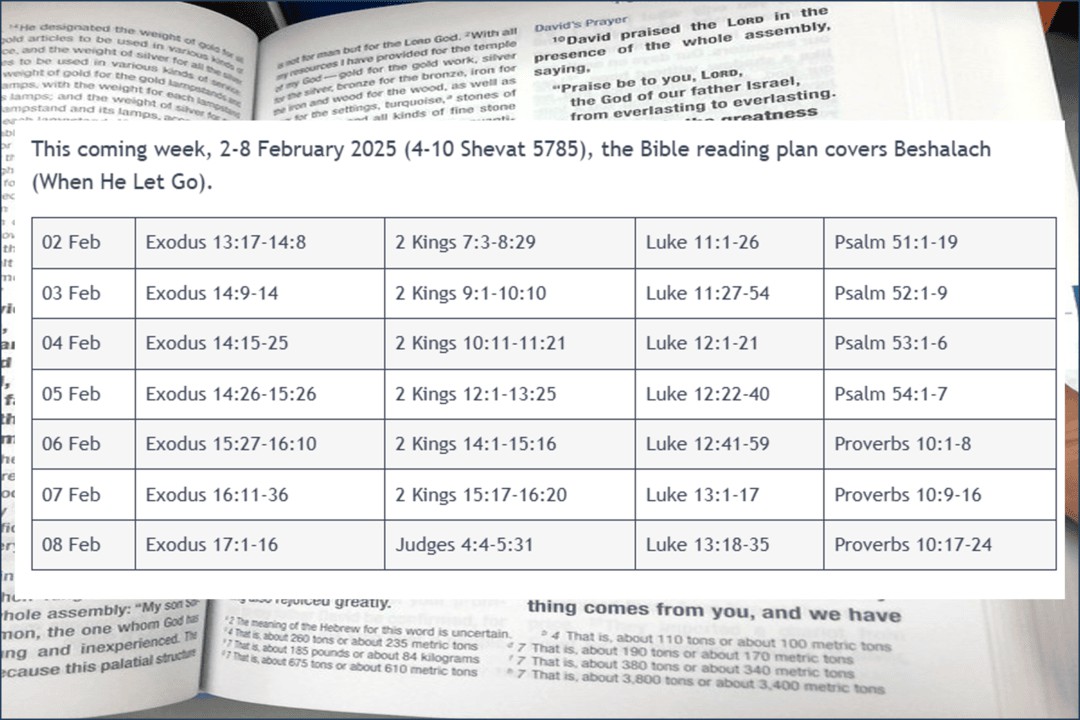Watch
Events
Articles
Market
More
This coming week, 2-8 February 2025 (4-10 Shevat 5785), the Bible reading plan covers Beshalach (When He Let Go).
https://thebarkingfox.com/2025..../01/31/weekly-bible-




This coming week, 2-8 February 2025 (4-10 Shevat 5785), the Bible reading plan covers Beshalach (When He Let Go).
https://thebarkingfox.com/2025..../01/31/weekly-bible-




You’re invited to join us for Shabbat over on our YouTube channel! At 8:30pm CDT, we will be hosting a Virtual Shabbat Gathering PREMIERE. Enjoy a powerful and insightful message by G. Steven Simons, as well beautiful worship music. See you soon! https://www.youtube.com/@TriumphInTruthMedia




The #passover is one of the most profound and prophetic events in all of Scripture. If you don't understand it, you won't understand a lot of other things that came later.
https://www.americantorah.com/....2022/04/26/killing-t



For those of you curious about what I've authored (since I've had a few questions about that) you can find that here: https://books.beiteshelpublications.org/ The Rogue Scholar is listed up on Amazon as well, but How To Do Nothing Well is not, since I didn't want it to have an ISBN.
#author #books #titles



Henk Wouters
that is why one should not have a problem with eating the Messiah's flesh, or do you not know that you are going to give of your flesh to be eaten too? (how's that for a cryptic comment?)
what is good to ponder on is WHY must we eat kosher, and WHY is that what is kosher defined as such.
now i love my chicken nick, and so it's going to be a real bummer if you convince me not to eat it anymore...(it's an hour vid, right now i can't fit it in, i intend to do so soonest).
i do encourage everybody (and hope that you indeed do so already) to make sure that the spiritual food you eat (aka knowledge) is also kosher...
Delete Comment
Are you sure that you want to delete this comment ?
Henk Wouters
i admire your sincerity and the effort you've put into it.
(for the general audience, it is only those, who display sincerity and effort, who attract my attention and admiration, because it is also commanded that that is how we are to approach the Word).
now, critique, for me, the jury is still out, because of two points,
if you can address those satisfactorily please.
1 - rev 18 talks about 'unclean' birds, rev 19 about birds, inferring ALL birds. ie both unclean and clean, so one can't compare the two directly.
2 - tha oldest aramaic targums were written around 2CE, so though the aramaic translation of the OT refers to 1450BC (haven't checked if that's exactly a good date, but i'll take your word for it), it wasn't written then, and so conceivably the connect between the hoopoe of the OT and the rooster of the NT is an error of translation...
comments - your argument about there not being chickens yet, esp in the middle east, at the time of the OT ARE convincing, chickens are a relatively new development from the wild jungle fowl, that argument you brought up about rooster vs temple crier is a new one to me, interesting,and lastly, yuck, those chickens did some disgusting things in the excepts you showed, in their defense, the way we 'farm' them can excuse ANY aberrant behaviour from any animal. i really hope we get held to account for how we treat creation placed under our care.
Delete Comment
Are you sure that you want to delete this comment ?
Rhy Bezuidenhout
When we did adjust their feed, they didn't peck each other. So it looks to be more of a need than a want. Similarly, pigeons will eat spiders, lizards and any meat when they are hungry. Them eating these unclean things should then also make them unclean. I can only assume as it isn't their preference to eat unclean insects and animals, that they are considered clean. In my view, it is the same as when there is a bug on a leaf that a clean animal eats; the entire animal or species doesn't become unclean.
I am going to spill some thoughts and hope to get some feedback on it:
I would personally place this thinking in the same category as the question about the dietary laws when a person is stranded on an island and there is nothing to eat other than unclean animals. Does life take precedence or the dietary laws? Yes, being stuck on an island isn't our everyday existence so we shouldn't use it as a measuring stick, but similarly it shouldn't be the norm for an animal in captivity to go hungry.
Should we therefore take their natural reaction to hunger as their norm?
On the other hand, I can even imagine that chickens eating mice and snakes could be through inbreeding or a base instinct in the original wild bird variety they came from.
How do we classify a chicken that is never in a position to eat unclean as they are in cages and fed enough? We have to keep in mind that a commercial chicken, specifically a broiler chicken raised for meat, is typically slaughtered around 6 weeks old (around 35-42 days old) so they need a lot of food (and hormones) very quickly. Is the entire species now unclean or the birds that eat unclean?
My wondering is, if their uncleanness is in what they eat and they eat not then should they be considered unclean as they "fit the species" of a quale? (This thinking is exactly the same thought process we are imposing on people...)
Delete Comment
Are you sure that you want to delete this comment ?